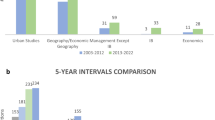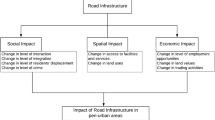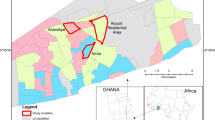Abstract
This article scrutinizes the consequences that arise when current modes of urban governance fail to consider the micro-geographies of market trading during urban regeneration and relocation processes. It argues that the marketplace possesses significant and complex spatial dimensions that are fundamental to the sustenance and capital accumulation of traders. Findings from an empirical scrutiny of the regeneration of market infrastructure in Cape Coast reveal that the unwillingness of municipal authorities to consider the spatial dimensions of market trading during a period of temporary relocation caused negative consequences for traders, who experienced loss of customers, loss of capital, low savings, inability to meet family responsibilities and deterioration in health, among others. In response, the traders devised several coping strategies to survive these experiences. Due to the intimate relationship between state and non-state actors in urban governance, the municipal authority in Cape Coast not only suffered a sharp decline in its revenue generation but also could not recoup the funds invested in the development of the temporary markets. This study calls for inclusive urban governance in market development projects in order to preserve the spatial characteristics of market trading during relocation.


Source: Authors’ Construct



Similar content being viewed by others

Notes
For the purpose of this study, traders within purpose-built municipal markets, whether selling in a shop or a designated open space or market square, are formal and distinguishable from street hawkers and other informal traders although their operations may be as informal, in some ways, as those of street vendors (Bromley and Mackie, 2009). The distinction is that the majority of traders pay market rents and tolls, are registered with the local government in charge of the markets and belong to market associations (Asante and Helbrecht, 2018a).
Fante is the local Akan dialect of the people of Cape Coast.
These 2 days were selected with the help of the traders themselves. They suggested Wednesday because most food items arrive on this day and so customers flock to the market to buy fresh produce. Saturday was selected because it is the day many of the city workers shop for the week ahead.
The use of the word ‘store’ indicates the distinction between this study and past studies on traders. In most cases, scholars have used the word ‘stall’ because they studied street traders who operated in temporary wooden structures. We focused on traders who sell within markets and mostly operate in concrete structures which are permanent. By way of definition, a stall inside a market is a booth with a dwarf concrete wall while a store is an enclosed space with a concrete wall up to the ceiling. In the temporary markets in Cape Coast, traders were allocated either a store or a floor space. In subsequent sections, we use the terms separately or apply the generic phrase ‘trading spaces’.
This means they have completed 9 years of formal primary and junior secondary education and obtained a Basic Education Certificate Examination (BECE) certificate.
Head-carry means to carry a tray or basket of goods on one’s head. It is a common trading practice among street traders and hawkers in many African countries.
References
Adaawen, S., & Jorgensen, H. S. (2012). Eking out a living: The livelihood implications of urban space regulation on street hawking in Accra, Ghana. African Review of Economics and Finance, 3(2), 49–95.
Adu-Ampong, E. A. (2017). Divided we stand: Institutional collaboration in tourism planning and development in the Central Region of Ghana. Current Issues in Tourism, 20(3), 295–314.
Agyei-Mensah, S. (2006). Marketing its colonial heritage: A new lease of life for Cape Coast, Ghana? International Journal of Urban and Regional Research, 30(3), 705–716.
Agyei-Mensah, S., & Ardayafio-Schandorf, E. (2007). The global and the local: Urban change in Cape Coast from pre-colonial times to the present. Urban Design International, 12(2–3), 101–114.
Amoah, S. T., Owusu-Sekyere, E., & Narteh, E. (2018). Urban space renaissance of a developing country city. Urban Research & Practice. https://doi.org/10.1080/17535069.2018.1467962.
Asante, L. A., & Helbrecht, I. (2018a). Conceptualising marketplaces in Anglophone West Africa: A sexpartite framework. GeoJournal. https://doi.org/10.1007/s10708-018-9946-4.
Asante, L. A., & Helbrecht, I. (2018b). Seeing through African protest logics: A longitudinal review of continuity and change in protests in Ghana. Canadian Journal of African Studies, 52(2), 159–181.
Asiedu, A. B., & Agyei-Mensah, S. (2008). Traders on the run : Activities of street vendors in the Accra Metropolitan Area, Ghana. Norwegian Journal of Geography, 63(2), 191–202.
Awuah, E. (1997). Mobilizing for change: A case study of market trader activism in Ghana. Canadian Journal of African Studies, 31(3), 401–423.
Baah-Ennumh, T. Y., & Adom-Asamoah, G. (2012). The role of market women in the informal urban economy in Kumasi. Journal of Science and Technology, 32(2), 56–67.
Bass, L. (2000). Enlarging the streets and negotiating the curb: Public space at the edge of an African market. International Journal of Sociology and Social policy, 20(1/2), 74–95.
Battersby, J., & Muwowo, F. (2019). Planning and governance of food systems in Kitwe, Zambia: A case study of food retail space. In J. Battersby & V. Watson (Eds.), Urban food systems governance and poverty in African cities (pp. 128–140). Oxon: Routledge.
Battersby, J., & Watson, V. (Eds.). (2019). Urban food systems governance and poverty in African cities. London: Routledge.
Bromley, R. D. F., & Mackie, P. K. (2009). Displacement and the new spaces for informal trade in the Latin American city centre. Urban Studies, 46(7), 1485–1506.
Clark, G. (1991). Colleagues and customers in unstable market conditions: Kumasi, Ghana. Ethnology, 30(1), 31–48.
Clark, G. (1994). Onions are my husband: Survival and accumulation by West African market women. Chicago: The University of Chicago Press.
Clark, G. (1999). Mothering, work, and gender in urban Asante ideology and practice. American Anthropologist, 101(4), 717–729.
Clark, G. (2010). African market women: Seven life stories from Ghana. Bloomington: Indiana University Press.
Devas, N. (2001). The connections between urban governance and poverty. Journal of International Development, 13(7), 989–996.
Devas, N., & Korboe, D. (2000). City governance and poverty: The case of Kumasi. Environment and Urbanization, 12(1), 123–136.
Egan, M., Lawson, L., Kearns, A., Conway, E., & Neary, J. (2015). Neighbourhood demolition, relocation and health: A qualitative longitudinal study of housing-led urban regeneration in Glasgow, UK. Health and Place, 33, 101–108.
Fält, L. (2016). From shacks to skyscrapers: Multiple spatial rationalities and urban transformation in Accra, Ghana. Urban Forum, 27(4), 465–486.
Fuseini, I. (2016). Urban governance and spatial planning for sustainable urban development in Tamale, Ghana. PhD. Thesis. Stellenbosch: Stellenbosch University.
Ghana Statistical Service. (2013). 2010 population and housing census district analytical report: Cape Coast Municipality. Accra: Ghana Statistical Service.
Gillespie, T. (2016). Accumulation by urban dispossession: Struggles over urban space in Accra, Ghana. Transactions of the Institute of British Geographers, 41(1), 66–77.
Gillespie, T. (2017). From quiet to bold encroachment: Contesting dispossession in Accra’s informal sector. Urban Geography, 38(7), 974–992.
Goetz, E. G. (2013). Too good to be true? The variable and contingent benefits of displacement and relocation among low-income public housing residents. Housing Studies, 28(2), 235–252.
Gombay, C. (1994). Eating cities: Urban management and markets in Kampala. Cities, 11(2), 86–94.
Goodfellow, T. (2018). Seeing political settlements through the city: A framework for comparative analysis of urban transformation. Development and Change, 49(1), 199–222.
Goodfellow, T., & Titeca, K. (2012). Presidential intervention and the changing “politics of survival” in Kampala’s informal economy. Cities, 29(4), 264–270.
Gough, K. (1999). The changing nature of urban governance in peri-urban Accra, Ghana. Third World Planning Review, 21(4), 393–410.
Grotefendt, N., Jacobsen, M., Kohlsdorf, T., & Wegener, L. (2018). Unemployment benefit recipients: causes, reactions and consequences of housing relocations. In I. Helbrecht (Ed.), Gentrification and resistance: Researching displacement processes and adaptation strategies (pp. 161–188). Wiesbaden: Springer Fachmedien Wiesbaden GmbH.
Handwerker, W. P. (1973). Kinship, friendship, and business failure among market sellers in Monrovia, Liberia. Journal of the International African Institute, 43(4), 288–301.
Harpham, T., & Boateng, K. A. (1997). Urban governance in relation to the operation of urban services in developing countries. Habitat International, 21(1), 65–77.
Harsch, E. (2009). Urban protests in Burkina Faso. African Affairs, 108(431), 263–288.
Hill, P. (1963). Markets in Africa. The Journal of Modern African Studies, 1(4), 441–453.
Hyland, A. D. (1995). The architectural history of Cape Coast. Transactions of the Historical Society of Ghana, 16(2), 163–184.
Ikioda, F. O. (2013). Urban markets in Lagos, Nigeria. Geography Compass, 7(7), 517–526.
Inkoom, D. (2014). Anloga woodworkers in Kumasi, Ghana: The long road to “formality”. In J. Duminy, J. Andreasen, F. Lerise, N. Odendaal, & V. Watson (Eds.), Planning and the case study method in Africa: The planner in dirty shoes (pp. 81–101). Hampshire: Palgrave Macmillan.
Kleinhans, R. (2003). Displaced but still moving upwards in the housing career? Implications of forced residential relocation in the Netherlands. Housing Studies, 18(4), 473–499.
Lelevrier, C. (2013). Forced relocation in France: How residential trajectories affect individual experiences. Housing Studies, 28(2), 253–271.
Li, X. (2018). Residents’ perceptions of impending forced relocation in urban China: A case study of state-led urban redevelopment in Shenyang. PhD. Thesis. Delft: Delft University of Technology.
Li, X., van Ham, M., & Kleinhans, R. (2016). Understanding the experiences of relocatees during forced relocation in Chinese urban restructuring (Discussion Paper No. 10140). Bonn.
Lindell, I. (2008). The multiple sites of urban governance: Insights from an African City. Urban Studies, 45(9), 1879–1901.
Lindell, I., & Ampaire, C. (2017). The untamed politics of urban informality: “Gray space” and struggles for recognition in an African city. Theoretical Inquiries in Law, 17(1), 257–282.
Lyons, M., & Snoxell, S. (2005). Sustainable urban livelihoods and marketplace social capital: Crisis and strategy in petty trade. Urban Studies, 42(8), 1301–1320.
Ministry of Local Government and Rural Development. (2012). National urban policy framework. Accra: Ministry of Local Government and Rural Development.
Monteith, W. (2015). A “market for the people”?: Changing structures of governance and participation in a Ugandan marketplace. Development, 58(1), 58–64.
Morris, A. (2015). A practical introduction to in-depth interviewing. London: Sage Publications Ltd.
Muchadenyika, D. (2015). Slum upgrading and inclusive municipal governance in Harare, Zimbabwe: New perspectives for the urban poor. Habitat International, 48, 1–10.
Obeng-Odoom, F. (2012). On the origin, meaning, and evaluation of urban governance. Norwegian Journal of Geography, 66(4), 204–212.
Obeng-Odoom, F. (2013). Governance for pro-poor urban development. Oxon: Routledge.
Obeng-Odoom, F. (2017). Urban governance in Africa today: Reframing, experiences, and lessons. Growth and Change, 48(1), 4–21.
Owusu, G., & Lund, R. (2004). Markets and women’s trade: Exploring their role in district development in Ghana. Norsk Geografisk Tidsskrift, 58(3), 113–124.
Owusu-Sekyere, E., Amoah, S. T., & Teng-Zeng, F. (2016). Tug of war: street trading and city governance in Kumasi, Ghana. Development in Practice, 26(7), 906–919.
Planel, S., & Bridonneau, M. (2017). (Re)making politics in a new urban Ethiopia: An empirical reading of the right to the city in Addis Ababa’s condominiums. Journal of Eastern African Studies, 11(1), 24–45.
Rosenfeld, O. (2013). Governance of relocation: An examination of residential relocation processes in housing market renewal areas in England. Housing Studies, 28(2), 338–362.
Saunders, M., Lewis, P., & Thornhill, A. (2016). Research methods for business students. Essex: Pearson Education Limited.
Seligmann, L. T. (2000). Market places, social spaces in Cuzco, Peru. Urban Anthropology, 29(1), 1–68.
Sey, M. (2012). Chaos over kotokuraba market—As traders refuse to relocate. Today Online. Retrieved from https://www.todaygh.com/chaos-over-kotokuraba-market-as-traders-refuse-to-relocate/. Accessed August 17, 2018.
Sheldon, K. (Ed.). (1996). Urban African women: Courtyards, markets and city streets. Colorado: Westview Press.
Sowatey, E., Nyantakyi-frimpong, H., Mkandawire, P., Arku, G., Hussey, L., & Amasaba, A. (2018). Spaces of resilience, ingenuity, and entrepreneurship in informal work in Ghana. International Planning Studies, 23(4), 327–339.
Steel, W. F., Ujoranyi, T. D., & Owusu, G. (2014). Why evictions do not deter street traders: Case study in Accra, Ghana. Ghana Social Science Journal, 11(2), 52–76.
Thiel, A., & Stasik, M. (2016). Market men and station women: Changing significations of gendered space in Accra, Ghana. Journal of Contemporary African Studies, 34(4), 459–478.
Walshe, C., Ewing, G., & Griffiths, J. (2012). Using observation as a data collection method to help understand patient and professional roles and actions in palliative care settings. Palliative Medicine, 26(8), 1048–1054.
Yin, R. K. (2011). Qualitative research from start to finish. New York: The Guilford Press.
Yntiso, G. (2008). Urban development and displacement in Addis Ababa: The impact of resettlement projects on low-Income households. Eastern Africa Social Science Research Review, 24(2), 53–77.
Yu, J.-H., & Kwon, H.-R. (2011). Critical success factors for urban regeneration projects in Korea. International Journal of Project Management, 29(7), 889–899.
Acknowledgements
We would like to acknowledge the support of the Government of Ghana and the German Academic Exchange Services (DAAD) for providing the scholarship for the doctoral programme, on which this article is based.
Author information
Authors and Affiliations
Corresponding author
Ethics declarations
Conflict of interest
We disclose that there is no potential conflict of interest regarding this paper.
Human and animal rights statement
We used human participants and have protected their identity. We have their consent to publish their interviews.
Additional information
Publisher's Note
Springer Nature remains neutral with regard to jurisdictional claims in published maps and institutional affiliations.
Rights and permissions
About this article
Cite this article
Asante, L.A., Helbrecht, I. Urban governance and its implications for the micro-geographies of market trading in Ghana: a case of the Kotokuraba Market Project in Cape Coast. GeoJournal 85, 1203–1225 (2020). https://doi.org/10.1007/s10708-019-10018-0
Published:
Issue Date:
DOI: https://doi.org/10.1007/s10708-019-10018-0



